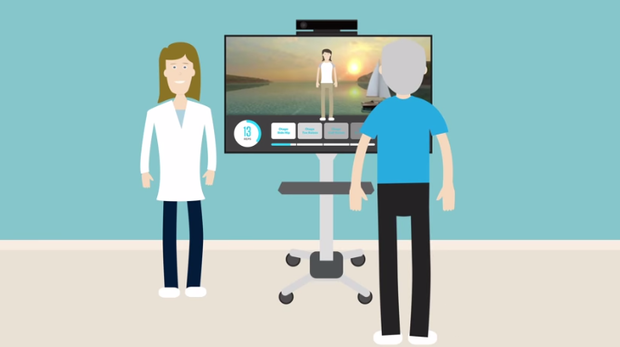12 companies leading the way in digital health

RespondWell offers digital therapy sessions.
Image: RespondWell
The healthcare system in the US moves extraordinarily slow, which, of course, can be frustrating for everyone involved -- doctors, patients, caregivers, and all those people caught in between.
The bright side, however, is that there is plenty of room for innovation, and startups are realizing the potential for technological advancement in the healthcare industry. Here are 12 companies changing the way we understand and provide healthcare.
1. Evolent Health
Evolent Health became popular right around the time when the Affordable Care Act went into effect, and it's still rapidly growing. The company sells software, advisory services, and information technology to hospitals and healthcare providers. The technology they use is called "Identifi," and it gathers and crunches relevant data about patients so that doctors can better treat them at lower costs.
2. Doximity
Doximity is basically a LinkedIn for physicians. The company, which launched in 2011, now has 400,000 physicians using the site, and that number is still growing. That means as of December 2014, more than half of US physicians use the service as a secure platform to discuss topics with their peers.
3. Proteus Digital Health
Proteus Digital Health makes an ingestible sensor made entirely of edible ingredients that you take alongside your medications. Your body powers the sensor, and it communicates with a patch that you wear that detects heart rate, heart activity, and rest. All that information is sent to your smartphone, so you can see how your body is working inside and out, and how it's reacting to medicine as well. The company is also working on a series of "digital medicines," basically building a digital health platform.
4. Perfint Healthcare
Perfint Healthcare makes new technology, specifically robots for oncologists -- doctors who specialize in cancer treatment. Maxio is a robot assistant that was designed to help doctors with cancer diagnostics, treatment, and surgery. The robot is more accurate than a human in detecting exactly where a needle should be inserted into a tumor, for instance. Robio is another robot that helps target tumor treatment or therapy, and helps with drainage, biopsies, and pain management.
5. Oscar
Oscar offers services in New York and New Jersey. The company is trying to revamp the health insurance business model. You use the app to describe your symptoms, click to talk to a doctor about them, view all your visits, prescriptions, and medical history in a timeline, and then easily receive health insurance quotes. The company also pays you money to keep track of your fitness and work towards goals.
6. Zest Health
Zest Health is trying to streamline healthcare insurance processes. The company offers 24/7 registered nurse concierge services, appointment scheduling with in-network providers, employer messaging, simple access to all your health benefits, and a marketplace to make it easier for you to view and/or change benefits or get services when you need them.
7. Nanobiosym
Nanobiosym is a Cambridge, Massachusetts-based company that develops handheld diagnostic machines for HIV and other serious diseases. The company is trying to get these machines in the hands of people in developing nations around the world to better diagnose and understand HIV rates and treatment. An HIV test in the US takes two weeks for results, and in other countries, the wait is often months. Using GENE-Radar, Nanobiosym's device, results can be delivered in less than an hour.
8. CliniOps
CliniOps is a company trying to digitize and transform clinical trials to make them more efficient. It's an application that automates electronic document submission and sends reminders to patients participating in the trial. It does checks on patients, who can upload photos and videos to show progress, using a tablet application, and then uploads the information to the cloud. This way, it can analyze trends and problems with the research in real-time, rather than waiting until the end of the trial.
9. RespondWell
RespondWell started from a fitness game on an XBox. It was so popular, that they decided to enter the digital therapy industry, so they created the RespondWell Rehab Platform. The patient's program is delivered through a touch screen, using a virtual therapist that encourages them. The patient can choose their music, therapist, and environment they want to see. The performance data is then uploaded to the cloud and analyzed. The system is HIPAA compliant and integrates EMR as well.
10. Augmedix
Augmedix uses Google Glass to push information like notes, photos, and other information to Electronic Medical Records. It works with most major EMR systems and allows doctors to spend more time on patient care and less time entering information into these slow systems.
11. AdhereTech
AdhereTech makes smart, wireless pill bottles that collect and send data in real-time. If a patient misses a dose, it sends an alert like an automated phone call or text. The company wants to improve adherence to medications and also improve clinical trial efficiency and research in the pharmaceutical industry. Right now, the technology is currently available to the public in pilots with pharmaceutical companies, pharmacies, and hospitals.
12. Butterfly Network
Butterfly Network uses a new approach to diagnostic and therapeutic imaging using "devices, deep learning, and the cloud." What that means is they make a small handheld device that they want to use to make medical imaging, like MRIs and ultrasounds, much faster, cheaper, and smarter. To democratize imaging and get better, faster results, the company wants to enlist the expertise of other types of scientists and then use artificial intelligence to analyze the images and handle huge amounts of data to more accurately diagnose patients. The company wants to launch the product sometime in the next year or so.

